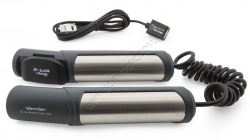
Vernier Hand-Grip Heart Rate Monitor - hand grips and receiver.
Enlarge

HGH-BTA and GW-BTA in use with a LabQuest 2 and and iPad.
Enlarge

Vernier Hand-Grip Heart Rate Monitor - hand grips and receiver.
Enlarge

HGH-BTA and GW-BTA in use with a LabQuest 2 and and iPad.
Enlarge
Vernier Hand-Grip Heart Rate Monitor
Order code: HGH-BTA
VERNIER HAND GRIP HEART RATE MONITOR
The Vernier Hand-Grip Heart Rate Monitor is ideal for determining a person's heart rate while mobile or stationary. With this sensor heart rate can be monitored during, as well as after exercise. The sensor consists of wireless hand grips and a receiver module that plugs into any of our data-collection devices. The hand grips sense the electrical signals generated by the heart, much like an ECG. For each pulse detected, a signal is transmitted to the receiver module and the individual's pulse rate is calculated.
Specifications:
• Receiver range: 80–100 cm
• Transmitter transmission frequency: 5 kHz ±10%
• Receiver current consumption: 30–55 µA
• Transmitter operating temperature: 0–60 ˚C
WARNING: KEEP OUT OF REACH OF CHILDREN.
Contains Button Cell Battery.
New and used Button Cell Batteries are Hazardous and can cause serious injuries if swallowed or placed inside any part of the body. Medical attention should be sought immediately if it is suspected a battery has been swallowed or placed inside any part of the body.
| User Manual | Vernier Hand-Grip Heart Rate Monitor | ||
Educational use only:
Vernier and Kidwind products are designed for educational use. They are not appropriate for industrial, medical or commercial applications. Details
Warranty
- Warranty: 5 years
Dimensions- Package size (HxWxD): 83x83x267mm
- Packed weight: 430g
Last edited 16th May 2025
Videos:
 This product is used in teaching these Australian Curriculum codes:
This product is used in teaching these Australian Curriculum codes:
ACSBL115 - Maintaining the internal environment - Homeostasis - Animals, whether osmo-regulators or osmo-conformers, and plants, have various mechanisms to maintain water balance that involve structural features, and behavioural, physiological and homeostatic responses
ACSBL111 - Maintaining the internal environment - Homeostasis - Changes in an organism’s metabolic activity, in addition to structural features and changes in physiological processes and behaviour, enable the organism to maintain its internal environment within tolerance limits
ACSBL110 - Maintaining the internal environment - Homeostasis - Homeostasis involves a stimulus response model in which change in external or internal environmental conditions is detected and appropriate responses occur via negative feedback; in vertebrates, receptors and effectors are linked via a control centre by n
ACSSU175 - Biological Sciences - Organ Systems - Multi-cellular organisms rely on coordinated and interdependent internal systems to respond to changes to their environment
Click a curriculum code to see other products that relate.
| Similar Products: | From |
| BPS-BTA - Vernier Blood Pressure Sensor | $298.00 |
| EKG-BTA - Vernier EKG Sensor | $468.00 |
Documents: Catalogue | Vernier Catalogue K-12 | Catalogue | Vernier Catalogue Uni | Catalogue | Scientrific April 2025 Mini Catalogue | Catalogue | Vernier 2025 K-12 Catalogue | Catalogue | Vernier 2025 University Catalogue | Compatibility Guide | Sensor-Interface-Software Requirements (external link) | Experiment | MS Heart rate and exercise | User Manual | Vernier Hand-Grip Heart Rate Monitor | | |||||||||||||||||
Note: Prices do NOT include GST or freight


